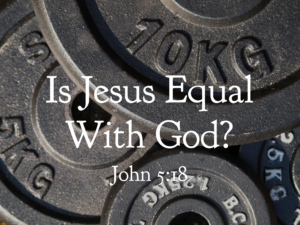The first chapter of the letter to the Hebrews is a favorite text for those attempting to prove the deity of Christ. However, when examined more closely, the text fails to provide support for the fourth century doctrine.[1] For example, in a related post, we examined Hebrews 1:1-2 in light of the claim that Jesus is the Creator of the world. We discovered that the first two chapters are not about the Genesis creation at all, but about the coming kingdom age.[2] Moreover, we learned that God prepared the coming kingdom on account of or on behalf of it’s future king, a point that Paul makes in his letter to the church in Colossae.[3] We concluded that Jesus is not the Creator, for one thing, because he is God’s appointed heir. Language and logic demand that you cannot inherit what you already own.
But what about the author’s description of Jesus in the next few verses? Doesn’t this prove he is God?
Hebrews 1:3-4 (NASB) And He [Jesus] is the radiance of His [God’s] glory and the exact representation of His nature, and upholds all things by the word of His power. When He had made purification of sins, He sat down at the right hand of the Majesty on high, 4 having become as much better than the angels, as He has inherited a more excellent name than they.
We’ll examine this passage one phrase at a time in order to discover what the author had in mind and whether or not it supports the claim that Jesus is God.
He is the radiance of His glory
What does it mean to radiate God’s glory? The word radiance is apaugasma in the Greek, and it means radiance; a light flashing forth; to beam forth, gleam.[4] The word glory is doxa in the Greek, and it means opinion, hence praise, honor, glory.[5] Thus, the author is communicating that Jesus shines forth or radiates what is praiseworthy, honorable, and glorious about God. Paul writes of this very thing in his second letter to the church in Corinth:
2 Corinthians 4:6 (NASB) For God, who said, “Light shall shine out of darkness,” is the One who has shone in our hearts to give the Light of the knowledge of the glory of God in the face of Christ. (emphasis added)
 It’s important to note that in both of these passages, Jesus is not said to be radiating his own God-glory, rather he is shining forth the glory of God the Father.[6] In fact, the context of Paul’s comments to the Corinthians[7] reveals that he is making an analogy between Moses, who radiated God’s glory on Mt. Sinai under the old covenant,[8] and Jesus, who radiates God’s glory in the new covenant. The apostle says that we have the knowledge of God’s glory because Jesus reflected it to mankind. In other words, like Moses, God’s glory can be seen in the “face” or life of Christ. Paul goes on to say that believers, as ministers of reconciliation, are being transformed into this same glorious image:
It’s important to note that in both of these passages, Jesus is not said to be radiating his own God-glory, rather he is shining forth the glory of God the Father.[6] In fact, the context of Paul’s comments to the Corinthians[7] reveals that he is making an analogy between Moses, who radiated God’s glory on Mt. Sinai under the old covenant,[8] and Jesus, who radiates God’s glory in the new covenant. The apostle says that we have the knowledge of God’s glory because Jesus reflected it to mankind. In other words, like Moses, God’s glory can be seen in the “face” or life of Christ. Paul goes on to say that believers, as ministers of reconciliation, are being transformed into this same glorious image:
2 Corinthians 3:18 (NASB) But we all, with unveiled face, beholding as in a mirror the glory of the Lord, are being transformed into the same image from glory to glory, just as from the Lord, the Spirit. (emphasis added)
Thus, in whatever way Jesus radiates or reflects the glory of God, we are, in the same way, being transformed by the power of the Spirit into the same image, from one degree of glory to another. Jesus also used this imagery when spoke of believers in the Father’s kingdom:
Matthew 13:43 (NASB) “Then the righteous will shine forth as the sun in the kingdom of their Father. He who has ears, let him hear. (emphasis added)
Thus, being the radiance of God’s glory–as Moses, Jesus and believers are–does not equate with being God.
The exact representation of His nature
But what about Jesus being the exact representation of God’s nature? Surely, this proves he is God:
Hebrews 1:3-4 (NASB) And He is the radiance of His glory and the exact representation of His nature, and upholds all things by the word of His power. When He had made purification of sins, He sat down at the right hand of the Majesty on high, 4 having become as much better than the angels, as He has inherited a more excellent name than they. (emphasis added)
 The words exact representation are translated from the Greek word charakter, which is a tool used for engraving. By implication, charakter is an impression or representation, an exact reproduction or likeness.[9] By definition, a representation or reproduction, even an exact one, is not the original, but a copy or mirror image of it. (This is explored in more detail in Jesus, the Image of God.)
The words exact representation are translated from the Greek word charakter, which is a tool used for engraving. By implication, charakter is an impression or representation, an exact reproduction or likeness.[9] By definition, a representation or reproduction, even an exact one, is not the original, but a copy or mirror image of it. (This is explored in more detail in Jesus, the Image of God.)
The word nature in the Greek is hypostatis, which means substance, steadiness, assurance or reality.[10] We are familiar with its usage in the passage from Hebrews 11 which describes faith as being the assurance (hypostatis) of things hoped for, i.e., the reality or evidence of what is not seen.[11] Thus, the invisible God, was “seen” or revealed when the Christ imaged, represented or reflected God’s reality, substance or assurance to mankind. How did Jesus accomplish this? By only speaking the words the Father had given him[12] and by doing only what God had given him to do.[13] If the author of Hebrews believed Jesus to be God he could have easily and plainly said, “Jesus is God.” Instead, he was conveyed that Jesus fully represented who God is to mankind.[14]
He upholds all things by the word of his power
The next phrase in the text we’re examining is also used in an attempt to prove that the Christ (Messiah) is God:
Hebrews 1:3-4 (NASB) And He is the radiance of His glory and the exact representation of His nature, and upholds all things by the word of His power. When He had made purification of sins, He sat down at the right hand of the Majesty on high, 4 having become as much better than the angels, as He has inherited a more excellent name than they. (emphasis added)
The phrase word of his power simply means his authority. Thus, Jesus upholds all things by his authority. But what does all things refer to? According to the context, it’s a reference to Jesus’ authority over the world to come:
Hebrews 2:5 (NASB) For He did not subject to angels the world to come, concerning which we are speaking. (emphasis added)
 Paul speaks of this very thing in Colossians 1:17 when he says that in Jesus, all things (pertaining to the coming kingdom) hold together. But where did Jesus get the word of his power, that is, his authority? Does it innately belong to him because he is God? Not according to Scripture. The Bible says the authority was given to him:
Paul speaks of this very thing in Colossians 1:17 when he says that in Jesus, all things (pertaining to the coming kingdom) hold together. But where did Jesus get the word of his power, that is, his authority? Does it innately belong to him because he is God? Not according to Scripture. The Bible says the authority was given to him:
John 3:35 (NASB) the Father loves the Son and has given all things into Jesus’ hands (emphasis added)
John 17:2 (NASB) even as You gave Him authority over all flesh, that to all whom You have given Him, He may give eternal life. (emphasis added)
Matthew 11:27a (NASB) 27 “All things have been handed over to Me by My Father… (emphasis added)
Matthew 28:18 (NASB) And Jesus came up and spoke to them, saying, “All authority has been given to Me in heaven and on earth. (emphasis added)
Daniel 7:14 (NASB) “And to Him was given dominion, glory and a kingdom, that all the peoples, nations and men of every language might serve Him… (emphasis added)
If Jesus is God, the authority would inherently belong to him. But as God’s human Messiah, the authority to rule all things in the world to come was, by necessity, delegated to him.
He sat down at the right hand of the Majesty on high
Jesus’ subordinate position is further evidenced by the next phrase of the text under review:
Hebrews 1:3-4 (NASB) And He is the radiance of His glory and the exact representation of His nature, and upholds all things by the word of His power. When He had made purification of sins, He sat down at the right hand of the Majesty on high, 4 having become as much better than the angels, as He has inherited a more excellent name than they. (emphasis added)

Scripture always refers to God the Father as the Majesty on high (i.e., the highest Majesty). Over twenty times, the New Testament states that Jesus is seated at the right hand of God. To sit at the right hand of a king was a place of honor and delegated authority.[15] The same can be said of God and His Christ. By definition, if Jesus is seated next to the highest Majesty, then he is not the Majesty on high.[16] The author of Hebrews elaborates:
Hebrews 8:1-2 (NASB) Now the main point in what has been said is this: we have such a high priest, who has taken His seat at the right hand of the throne of the Majesty in the heavens, 2 a minister in the sanctuary and in the true tabernacle, which the Lord pitched, not man. (emphasis added)
The word minister is leitourgos in the Greek and it means servant. Thus, Jesus serves the Majesty on high as the high priest or mediator. One of his functions is to intercede with God on our behalf.[17] Paul echoes this truth in his first letter to Timothy:
1 Timothy 2:5 (NASB) For there is one God, and one mediator also between God and men, the man Christ Jesus (emphasis added)
Thus, Jesus is not the one God but the man whom God exalted to His right hand because of his obedience.[18]
That the Messiah is seated at Yahweh’s right hand is mentioned several times by the author of Hebrews.[19] It is a reference to a Davidic Psalm:
Psalm 110:1 (NASB) The LORD [Yahweh] says to my Lord [adoni]: “Sit at My right hand until I make Your enemies a footstool for Your feet.” (emphasis added)
This is one of the Old Testament’s most often quoted or alluded to verses in the New Testament. Unfortunately, its significance is often overlooked or misunderstood. Here King David says that the LORD (Yahweh) said to his Lord (adoni),[20] “sit at my right hand.” Of interest is the fact that Lord here is the Hebrew word adoni, a word which is always used to refer to a human lord and never deity.[21] (Adoni should not be confused with adonay which is often used as a substitution for Yahweh.) In other words, God did not invite God to sit at His right hand. Rather, Yahweh invited David’s Lord, that is, the human Messiah, to sit at His right hand. If Jesus is God, he doesn’t need God to exalt him to a place of authority because he would already be supreme.
Having become as much better than the angels, as he has inherited a more excellent name than they.
The last phrase under review has to do with Jesus’ superiority to angels:
Hebrews 1:3-4 (NASB) And He is the radiance of His glory and the exact representation of His nature, and upholds all things by the word of His power. When He had made purification of sins, He sat down at the right hand of the Majesty on high, 4 having become as much better than the angels, as He has inherited a more excellent name than they. (emphasis added)
 If Jesus is God, he would, by virtue of who he is, be better than the angels. But this verse says that he became better than the angels. In other words, Jesus wasn’t always superior to them. God, however, exalted him to His right hand and made him greater than the heavenly beings. Indeed, Jesus inherited or was given a name that is more excellent than all others names.[22] The result being that God the Father is glorified.[23] Obviously, if Jesus is God, this passage makes no sense as he would inherently be greater and his name more glorious than all of the angelic beings.
If Jesus is God, he would, by virtue of who he is, be better than the angels. But this verse says that he became better than the angels. In other words, Jesus wasn’t always superior to them. God, however, exalted him to His right hand and made him greater than the heavenly beings. Indeed, Jesus inherited or was given a name that is more excellent than all others names.[22] The result being that God the Father is glorified.[23] Obviously, if Jesus is God, this passage makes no sense as he would inherently be greater and his name more glorious than all of the angelic beings.
Why did God exalt Jesus above the angels? The author of Hebrews answers this question for us:
Hebrews 2:9 (NASB) But we do see Him who was made for a little while lower than the angels, namely, Jesus, because of the suffering of death crowned with glory and honor, so that by the grace of God He might taste death for everyone. (emphasis added)
Jesus was exalted above the angels because he obeyed the will of his Father and went to the cross. For this reason, he was crowned with glory and honor.
In summary, Hebrews 1:3-4 does not prove Jesus is God. On the contrary, it proves that he is God’s faithful representative and obedient servant who imaged the invisible God to the world. After God raised Jesus from the dead, He gave him a name, higher and more exalted than any other name, even that of the angels, and invited him to sit at His right hand to serve as the human mediator between God and man.
[1] The doctrine of Jesus’ deity was made official dogma of the Catholic Church in 325 A.D.
[2] Hebrews 1:2 and 2:5.
[3] Colossians 1:16-17.
[4] NASB Greek-Hebrew Dictionary; Strong’s Exhaustive Concordance.
[5] NASB Greek-Hebrew Dictionary.
[6] The author is speaking of God in verse 1, who has a Son in verse 2-3. Thus, we conclude he is referring to God the Father.
[7] 2 Corinthians, chapters 2 and 3.
[8] Exodus 34:29-35; 2 Corinthians 3:13-14.
[9] Strong’s Exhaustive Concordance.
[10] Later, Church fathers adopted the Gnostic definition of hypostases to mean a distinct intellect or person and not simply a substance. See The God of Jesus by Kegan Chandler, p. 116ff.
[11] Hebrews 11:1.
[12] Jesus only spoke the words God had given him to speak: John 7:16-17; 8:28, 38, 40; 12:49-50; 14:10, 24.
[13] Jesus only did what God told him to do: John 4:34; 5:19, 30, 36; 8:28; 14:10; 17:1, 3-4. Jesus did not even come on his own initiative: John 7:28 and 8:42.
[14] John 14:7.
[15] A position at the right hand was regarded as the chief place of honor and power (Psalm 45:9; 80:17; 110:1; Matthew 26:64). Bible Study Tools Dictionary, accessed 11-22-19. http://www.biblestudytools.com/dictionary/hand/
[16] 2 Peter 1:16 says that “we were eye witnesses of [Jesus’] majesty.” Majesty means splendor, magnificence. It is the same root word used for the false god Diana of Athens in Acts 19:27. Thus, earthly kings, false gods, etc. may be said to possess majesty, but God alone is the highest majesty!
[17] Romans 8:34; Hebrews 7:25.
[18] Philippians 2:9-11.
[19] Hebrews 1:3; 1:13; 8:1; 10:12 and 12:12.
[20] Psalm 110:1, Biblehub.com, accessed 11-23-19, https://biblehub.com/interlinear/psalms/110-1.htm
[21] Sir Anthony Buzzard, footnote to Hebrews 8:1, The One God, the Father, One Man Messiah Translation, (McDonough, GA: Restoration Fellowship), p. 550.
[22] Ephesians 1:20-21.
[23] Philippians 2:9-11.




“The word minister is leitourgos in the Greek and it means servant. Thus, Jesus serves the Majesty on high as the high priest or mediator. One of his functions is to intercede with God on our behalf.”
Hello I’m a Biblical Unitarian, but I kinda wondering if what is said above is being done currently by Jesus? Is the scene in heaven like a King and Prince in a palace where a citizen begs for the King’s mercy, and the prince beside Him intercedes in behalf of that citizen. Is that what Jesus do today as a Mediator and Intercessor? If so, can Jesus actually hear prayers today while in heaven as a glorified immortal man? Please guide me in understanding these things. Thank you so much.
Hello Jeromel! Thanks for reading the article and for reaching out. Your example of God as the King and Jesus as His prince is an appropriate one. Jesus is currently interceding for us:
Hebrews 7:23-25 (NASB) The former priests, on the one hand, existed in greater numbers because they were prevented by death from continuing, but Jesus, on the other hand, because He continues forever, holds His priesthood permanently. Therefore He is able also to save forever those who draw near to God through Him, since He always lives to make intercession for them.
The text says Jesus always lives to make intercession. Not that he will in the future begin to make intercession, but that he is currently functioning in the intercessory role.
In addition, Paul wrote to Timothy in 1 Timothy 2:5 that Jesus is the mediator between God and man. The context seems to indicate that Jesus’ mediation or intercession is now in operation because Paul concludes in verse 8 that since Jesus is our mediator, “Therefore…pray…”
One last thought, when Paul wrote in 2 Corinthians 12:8, he implored the Lord three times. I take “Lord” here to mean Jesus. So Paul was praying to Jesus asking him to intercede on his behalf and remove the thorn in his flesh.
To answer your question, can Jesus actually hear our prayers today while in heaven, I would say yes! Although we are not told specifically how Jesus is able to know what we are praying, I would suggest it is because the Father has given him the Spirit.
Hope this helps. Thanks again for visiting the website. God bless!
Could you also explain John 1:1-5 where it says that In the beginning was the Word and the Word was with God and was God. He was in the beginning with God and came into being thru Him and apart from Him not 1 thing came into being…
Thanks
Greetings Patricia!
Thanks for reaching out. Here is the first article in a three-part series that will answer your question regarding John 1:1ff. (You’ll find the links to the other two articles at the bottom of the article, or you can click on the Common Verses tab and select John 1) I think you will find it very helpful.
Blessings,
OGW